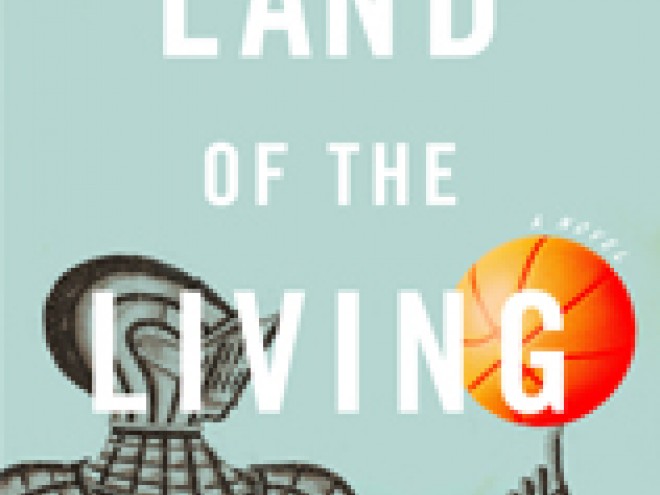 Between February 15, 2013 and March 10, 2013, Allison Amend and Austin Ratner, two members of the 2011 Sami Rohr Prize “class,” discussed literary fiction in society, their JBC Network tours, and the publication of their new novels — Allison’s new novel, A Nearly Perfect Copy, will be published this week, and Austin’s new novel, In the Land of the Living, was published last month. Read their redacted kvetchy correspondence below: |
 Dear Austin, So great to be having an email conversation with you. Having won the Sami Rohr Prize, you are official a Really Big Deal. My first question: How does it feel to be a Really Big Deal? Allison |
 Ha! I wish I did feel that way. There are so many anxieties surrounding the publication of a book. What if no one likes it? What if I should have written a different book in a different way? What if it is in fact a great book but the robots are about to take over? What if the robots find it boring? Anyway, this leads me to a question for you: There are so many challenges that lie in the way of creating a book — no amount of whining can ever really tell the tale of how hard it is — and yet when the victory comes and the author copies arrive, I can barely enjoy it. Can you? If so, how? |
 Dear Austin, I worry a bit more about the zombie apocalypse rather than the robot revolution, but that’s just my meshugas... I believe we cannot enjoy the moment for two reasons. One, we are writers, and so are a particularly navel-gazing bunch. When we look up from the navel, we worry that even though our books are doing well, they could have done better… Two, we are Jewish, and I was raised by my grandmother to believe that if anything good happens and you enjoy it, you’re just begging for Almighty to cut you down to size. And speaking of being Jewish, did you go to a lot of JBC Network events, and, if so, do you have favorite moments (change the names/locations to protect the innocent)? Allison |
 The JBC Network is a magnificent resource to Jewish writers. Of course, some of the events go better than others. Here is one particularly memorable story that sticks in my mind: [The following correspondence has been partially redacted.] The ****** event was ******. I was picked up at the airport by ************************. They asked ******************************* ****************** like, “************************************ *************************?” I explained about ***************** *************************. They seemed ********* and *** that the **************************************. ********, they explained, *** ***********************. ******************************************** ************************. (This is really true; it turned out that ******************************************************************* **************.) When we got to the ************ *** — this is also true — exactly *** *********************, and I think he was demented and had been looking for the toilet. So I ********* ************************************************************: the *********** JCC coordinator (who ***************************** *** *************** to ***** ************ and *************, she ******** *********************************); ******************************** *********************** *************************** fell asleep. Meanwhile, I am about to move out of my apartment, which is the one quiet place I’ve ever lived in in NYC. (The irony being that my extremely loud children live inside it with me.) Proust supposedly lined his office walls with cork. Any trouble with noise? Any solutions? Austin |
 [The following correspondence has been partially redacted.] Network memories… At one event the woman who picked me up *****************. We had to go around and pick up everyone who couldn’t drive anymore. Then we went to the kosher deli and she put the rolls in her purse. I also remember a ******** woman who claimed that the demise of Judaism was being effected by my generation marrying outside the faith. I pointed out I wasn’t married — to a Jew or a gentile — but if she knew anyone she should let me know. As to noise, I’m not terribly sensitive, but there’s noise, and then there’s the noise of little children wanting to play with you, which, along with waterboarding and sleep deprivation, has been declared a torture method by our government. I have belonged to writing spaces for years, mostly to get out of the house so I have to get dressed in the morning and converse with other humans. For a long time I belonged to the Writers Room in New York. Then I needed to look at different walls, so I joined Paragraph on 14th street. I love having an “office” to go to, and meeting in the kitchen to talk about writing. I’ve met lots of people who have introduced me to others in the community, and now I never stand awkwardly at a party again! And there’s free coffee. Ok, on a different topic, did you take time off of writing to promote/finish up In the Land of the Living? How do you juggle different projects in different phases? I’m trying to write something new, but I’m having trouble concentrating in anticipation of the book’s release. |
 I guess… there’s a pleasing rhythm to your work as a writer if you have the good fortune to publish more than one book: you take a break from the creative work on the next book to do a little bit of work promoting the last one or earning some money. Even non-writing activities can be a welcome relief, since doing nothing but open yourself to the muses can be a kind of torture in its unadulterated form. Let’s pretend we had a genie in a bottle and could make a wish. Given the many difficulties of writing and publishing fiction, what one thing would you change about the way society treats writers of literary fiction? |
 Let’s see… what I would like most from literary publishing would be to 1. earn a living wage from writing novels and 2. be paid a true advance like writers used to be paid. I get to live in New York, and I love to teach, but sometimes writing necessarily takes a secondary role to more pressing duties…there’s often just not a lot of creative energy left over. If you could wave your magic wand, what would you wish for? |
 I think I would cast a spell on myself that made it impossible for me to lose perspective when I hit all the little bumps and snags along the way in the writing life. Call it the bird’s-eye view spell: avitus oculus visum. Serenity now. Another question: how do you like giving elevator pitches about your book? You know, when people say what is it “about.” What is your book about? And what would your elevator pitch be if you already knew you were speaking to your ideal reader? |
 I know all about the elevator pitch from some time I spent in LA, where you should always have a log line to your movie ready in case you get into an elevator with Steven Spielberg. (It just occurred to me that his last name is SPIELberg. Awesome.) I do try to have a 10-word answer prepared and a 75-word answer, just in case. 10-word: It’s about art forgery and the impossibility of duplication or replication. (ok, it’s 11 words) 75 word: It’s the story of a woman who is the director of 18th-19th Century prints and drawings at a prestigious auction house in New York who is grieving her dead son. The other protagonist is a frustrated Spanish artist living in Paris who turns to forging artwork stolen by the Nazis during World War Two for recognition and money. Eventually their stories converge, and the book asks questions about authenticity and replication of the irreplaceable. (That’s 76 words). I have to resist the 1000 word answer, which is what I’d really like to give, to gift the reader all the nuances I’ve crammed into those 300 pages, but no one really wants to listen to that: It’s about love! And death! And science! And art! And marriage! And being an artist! And growing older! And raising children! And living in Paris! And New York! And art stolen by Nazis! And the insufficiency of reparations! The only question I hate getting, though, is “What kind of writing do you do?” I usually answer: “Literary fiction.” When the person stares at me blankly I add: “You know, stuff they read in college or in Oprah’s Book Club. Stuff no one buys.” Wait, there’s a question I hate more: “How many pages is your book?” If I answer that, what will that tell you? I know it’s just a question people ask when they don’t know anything about writing and want to express polite interest. I’m thrilled when someone wants to know that I do… and I’ll happily give that 1000 word explanation to whomever is interested. Your elevator pitch? |
 Your book sounds great to me. I love your idea of “replication of the irreplaceable.” My book is about loss in early, early childhood and how it projects itself throughout the rest of a person’s life. The theme is played out across two generations of a Jewish family from Cleveland, Ohio. |
 Sounds like an important theme you’re exploring — I can’t wait to read it. Maybe I could even have a copy signed by the author? This has been so much fun corresponding with you. I’m glad the JBC introduced us! |
 Likewise! Now, to the bar! |
Allison Amend, a graduate of the Iowa Writers’ Workshop, is the author of the Independent Publisher Book Award-winning short story collection Things That Pass for Love and the novels Stations West (a finalist for the 2011 Sami Rohr Prize for Jewish Literature and the Oklahoma Book Award) and A Nearly Perfect Copy. She lives in New York City.
Austin Ratner is author of the novels In the Land of the Living and The Jump Artist, winner of the Sami Rohr Prize for Jewish Literature, and the non-fiction book The Psychoanalyst’s Aversion to Proof. He is an M.D., studied at the Iowa Writers’ Workshop, and he teaches creative writing at the Sackett Street Writers’ Workshop in New York.


